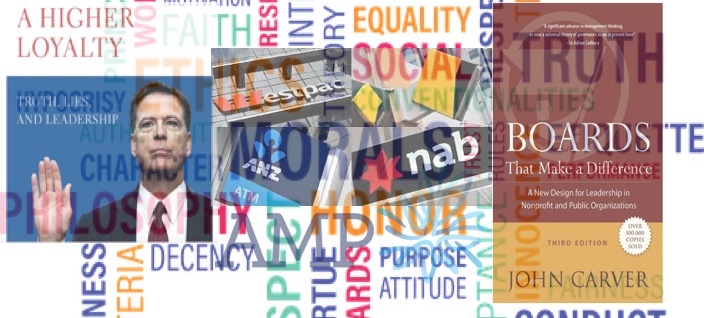Transparency in leadership can be confronting, especially when it’s forced out of you by a royal commission.
For many it’s no surprise that the banks and AMP have come so badly unstuck; I did many stories through the ‘80s and ‘90s as a journalist on ‘banks being bad’ and they always rated well, resonating with angry viewers.
But flip-side, I’ve worked with good boards and a lot of great CEOs, and I meet regularly with a group of talented leaders. Many conscientious leaders I know suffer night terrors, awake at night stressing about ethics, governance and doing the right thing by personnel.
Leadership is more learnt than taught, mostly by watching others and by making mistakes.
It’s made more complex now by disruption and the struggle for constant improvement in a rapidly changing environment. It’s one thing to do right, another to stay ahead.
Why is this relevant to Corporate Affairs, Crisis Management and Investor Relations? A company with amoral or immoral leaders cannot have a sustainably good reputation – you could once ‘fool some of the people all of the time’, much less so in this new information era. This is why, months ago, I wrote the bank’s should be asking for a Royal Commission – a clean out. Australia deserves banks with principled leaders.
Hence the value of James Comey’s must-read book – A Higher Loyalty: Truth, Lies, and Leadership. Comey, now hated by many on both sides of US politics, was the FBI Director that probably caused Hilary Clinton not to be elected, and who Trump sacked.
Most of the book is about Comey’s career long struggle to get leadership right; about his search for values by watching other people. It includes a part-career cleaning out the New York mafia, then working with Rudy Giuliani (“My supervisor told me… ‘The most dangerous place in New York is between Rudy and a microphone.’”); it includes being appointed Director of the FBI by Obama and finally being sacked by Trump.
Comey writes about the pairing of values: for instance, that confidence alone in a leader fails, but works when paired with humility.
When he finally got to lead the FBI in 2013 he needed to recruit a more diverse cross section of leadership into an overly white male workforce:
“In short, we would demand and develop ethical leaders. I knew a bit about this because I arrived at the FBI having spent decades watching leaders, reading about leaders, and trying to lead.
“I said we were going to paint a picture of what great leadership looks like… We would teach that great leaders are:
(1) people of integrity and decency;
(2) confident enough to be humble;
(3) both kind and tough;
(4) transparent; and
(5) aware that we all seek meaning in work.
We would also teach them that
(6) what they say is important, but what they do is far more important, because their people are always watching them.”
I read those 6 tips as the banks and AMP’s lack of ethics was being finally exposed in the early days of the commission. The brutally ugly aspect of the knowledge revolution is, people can hide less, and we are seeing more failure in leaders, in politics and business.
In Australia, we saw a devastating failure of leaders at the Royal Commission into Institutional Responses into Child Sex Abuse, and now we’re seeing it in the Financial Services Royal Commission.
And in politics there was (now justified) cynicism about Turnbull’s and Morrison’s resistance to the banking Royal Commission for so long; and later Kelly O’Dwyer’s obfuscating with Barry Cassidy on Insiders. As an aside, is the resistance to a government corruption watchdog in Canberra, as we have in the states, wilful blindness?
This clean-out we are witnessing is only the start of what’s been a long time coming.





